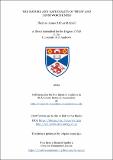The nature and rationality of trust and trustworthiness
Abstract
Trust and trustworthiness are highly important concepts; Trusting well enables us to achieve things we cannot do alone and to discover things that we cannot check for ourselves. Issues of trust sit in the intersection of ethics and epistemology; it is commonly thought of as a moral good to be trustworthy and trusting the testimony of others can be a valuable source of knowledge.
By trusting too easily, however, we become hopelessly naïve and risk falling prey to scams and lies. Knowing when to trust is therefore of significant practical value.
The aim of this thesis is to come to a greater understanding of these concepts. The first three chapters deal with what trust and trustworthiness are. In the first, I argue that trust is a kind of reliance, rather than a kind of belief. In the second, I argue that trust is specifically reliance on another to be trustworthy. The third chapter presents a theory of trustworthiness according to which being trustworthy is a matter of keeping commitments.
The following two chapters are about the rationality of trust. The first considers various ideas proposed for what justifies trusting someone and shows why they are not successful. The second lays out my own view, on which trust is justified by both evidence and practical reasons addressing another’s trustworthiness.
Finally, I consider the relationship between commitments and responsibility. It is argued that, by accepting a commitment to do something from another, one is absolved of responsibility for ensuring that it is done. This is also found to help explain why holding victims responsible is a mistake.
Ultimately, a holistic theory of trust and trustworthiness is proposed, which I believe has significant advantages over those already in the literature and will be useful in future philosophical research.
Type
Thesis, PhD Doctor of Philosophy
Rights
Creative Commons Attribution-ShareAlike 4.0 International
http://creativecommons.org/licenses/by-sa/4.0/
Collections
Except where otherwise noted within the work, this item's licence for re-use is described as Creative Commons Attribution-ShareAlike 4.0 International
Items in the St Andrews Research Repository are protected by copyright, with all rights reserved, unless otherwise indicated.


